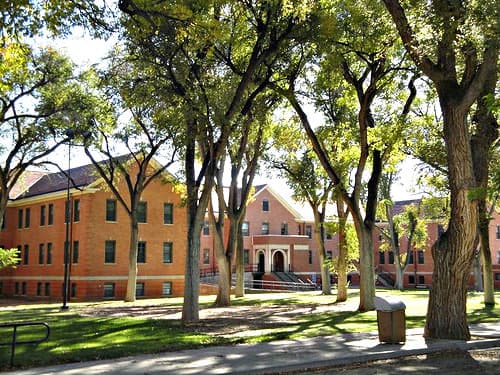

Williams' case worker in Denver suggested a new treatment program Colorado lawmakers funded this year at the former Fort Lyon state prison, more than 200 miles from the city in the far southeast corner of the state.
“They say the first step is getting in that van, getting here,” said Williams, “because once you’re here, it’s kinda like you’re stuck out here.”
People like Devonie get referred to the program by counselors at the Colorado Coalition for the Homeless in Denver. They come by choice and can stay up to two years.
Williams has been sober since she got here, partly because she’s in the middle of nowhere.
“It feels so good just to have your mind back, have straight thoughts, and think about real things and not where you going to get your next drink, how you going to make your next hustle to get that drink,” said Williams.
Director of the program James Ginsburg says that’s one of the advantages of Fort Lyon.
“In many ways it’s just to do something different,” said Ginsburg. “One of the running jokes in recovery is, the only thing you have to change is everything.”
The former army fort and sanitarium opened after the Civil War. It was a minimum security prison until two years ago, when the state shut it down due to the budget shortfall.
“It just feels like ... an Ivy League college campus,” said Ginsburg. “Some people call it the Princeton of the Plains.”
When the prison closed, it was a huge blow to the region’s economy. State leaders directed more than $10 million to reopen the facility for its new use.
Critics of the plan said addicts should be treated in their own communities, not shipped hundreds of miles away.
Ginsberg says that approach works for many people, “and we certainly are advocates of that, but there’s a certain population that cannot recover in the community.”
Ginsburg says there’s already a long waiting list for his program, dispelling another criticism that homeless people from the city wouldn’t be willing to come to the hinterlands for treatment.
In the cafeteria, counselors and administrators eat alongside residents like Art McCruiston. Fort Lyon wasn’t a tough sell for him. He’d been here before, 14 years ago as an inmate.
“I had good thoughts about this place,” said McCruiston, “so when they said it was a treatment center, I was like, ‘hell yeah, I’ll come.’”
It wasn’t your typical prison experience. He had his own room and was free to move around the facility.
Now, he says he’s in the same room he stayed in as a prisoner. McCruiston says it’s easier to stay sober out here because he’s not surrounded by his drinking buddies.
“I’m really liking myself, I’m liking this clean and sober thing,” said McCuiston, “so I’m trying to promote this as I go along to people that want to get on board and continue to stay clean and sober.”
Then, McCruiston lowers his voice and asks a question that has yet to be answered only three months into the program:
“What kind of success rate they going to have when these people back in society?” he asked.
Administrators admit they’re not sure how the counseling, treatment, and vocational programs will work for residents when they’re back in the city, surrounded by the same triggers that sent them to Fort Lyon in the first place.
Resident Devonie Williams knows this is the right place for her now.
“I feel like this positive energy,” said Williams, “but I know there’s going to be times when I’m going to think, ‘well, I want to be back in Denver.’”
She says it’s good to know that when those feelings creep up, she can’t easily run back to the city.









